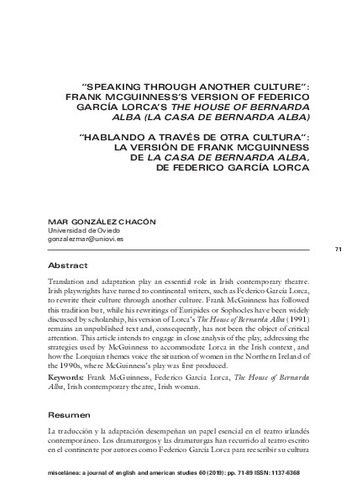«Speaking through Another Culture»: Frank McGuinness’s Version of Federico García Lorca’s The House of Bernarda Alba (La Casa de Bernarda Alba)
Author:
Subject:
Frank McGuinness, Federico García Lorca, The House of Bernarda Alba, Irish contemporary theatre, Irish woman
Publication date:
Publisher version:
Citación:
Descripción física:
Abstract:
Translation and adaptation play an essential role in Irish contemporary theatre. Irish playwrights have turned to continental writers, such as Federico García Lorca, to rewrite their culture through another culture. Frank McGuinness has followed this tradition but, while his rewritings of Euripides or Sophocles have been widely discussed by scholarship, his version of Lorca’s The House of Bernarda Alba (1991) remains an unpublished text and, consequently, has not been the object of critical attention. This article intends to engage in close analysis of the play, addressing the strategies used by McGuinness to accommodate Lorca in the Irish context, and how the Lorquian themes voice the situation of women in the Northern Ireland of the 1990s, where McGuinness’s play was first produced.
Translation and adaptation play an essential role in Irish contemporary theatre. Irish playwrights have turned to continental writers, such as Federico García Lorca, to rewrite their culture through another culture. Frank McGuinness has followed this tradition but, while his rewritings of Euripides or Sophocles have been widely discussed by scholarship, his version of Lorca’s The House of Bernarda Alba (1991) remains an unpublished text and, consequently, has not been the object of critical attention. This article intends to engage in close analysis of the play, addressing the strategies used by McGuinness to accommodate Lorca in the Irish context, and how the Lorquian themes voice the situation of women in the Northern Ireland of the 1990s, where McGuinness’s play was first produced.
Collections
- Artículos [37549]
- Filología Inglesa, Francesa y Alemana [591]
Files in this item





